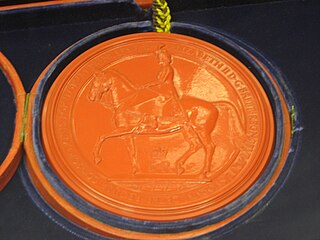
The Palace of Westminster serves as the meeting place for both the House of Commons and the House of Lords, the two houses of the Parliament of the United Kingdom. Informally known as the Houses of Parliament, the Palace lies on the north bank of the River Thames in the City of Westminster, in central London, England.

The chancellor of the Exchequer, often abbreviated to chancellor, is a senior minister of the Crown within the Government of the United Kingdom, and head of His Majesty's Treasury. As one of the four Great Offices of State, the Chancellor is a high-ranking member of the British Cabinet and is third in the ministerial ranking, behind the prime minister and the deputy prime minister.

A ceremonial mace is a highly ornamented staff of metal or wood, carried before a sovereign or other high officials in civic ceremonies by a mace-bearer, intended to represent the official's authority. The mace, as used today, derives from the original mace used as a weapon. Processions often feature maces, as on parliamentary or formal academic occasions.
Chancellor is a title of various official positions in the governments of many nations. The original chancellors were the cancellarii of Roman courts of justice—ushers, who sat at the cancelli or lattice work screens of a basilica or law court, which separated the judge and counsel from the audience. A chancellor's office is called a chancellery or chancery. The word is now used in the titles of many various officers in various settings. Nowadays the term is most often used to describe:

The lord chancellor, formally the lord high chancellor of Great Britain, is the highest-ranking traditional minister among the Great Officers of State in Scotland and England in the United Kingdom, nominally outranking the prime minister. The lord chancellor is appointed by the sovereign on the advice of the prime minister. Prior to their Union into the Kingdom of Great Britain, there were separate lord chancellors for the Kingdom of England and the Kingdom of Scotland; there were lord chancellors of Ireland until 1922.

The State Opening of Parliament is a ceremonial event which formally marks the beginning of a session of the Parliament of the United Kingdom. It includes a speech from the throne known as the King's Speech. The event takes place in the House of Lords chamber on the first day of a new session, which is usually in May or June, and traditionally in November, but can occur at any time of year depending on the timing of General Elections and parliamentary session start dates. It takes place in front of both Houses of Parliament. The monarch, wearing the Imperial State Crown, reads a speech that has been prepared by his or her government outlining its plans for that parliamentary year.

The Great Seal of the Realm or Great Seal of the United Kingdom is a seal that is used to symbolise the Sovereign's approval of state documents.
This article discusses the organizational and administrative structure of the Polish–Lithuanian Commonwealth.
Edmund, Earl of Rutland was the fourth child and second surviving son of Richard Plantagenet, 3rd Duke of York, and Cecily Neville. He was a younger brother of Edward, Earl of March, the future King Edward IV who came to the throne in 1461, the year after Edmund's death. He was born in Rouen, then the capital of English-occupied France and his father held the office of Lieutenant of France. He was killed at the age of 17 either during or shortly after the Battle of Wakefield, during the Wars of the Roses.

The Treaty of Union is the name usually now given to the treaty which led to the creation of the new state of Great Britain, stating that the Kingdom of England and the Kingdom of Scotland were to be "United into One Kingdom by the Name of Great Britain". At the time it was more often referred to as the Articles of Union.

The Clerk of the Crown in Chancery in Great Britain is a senior civil servant who is the head of the Crown Office.
Court appointments are the traditional positions within a royal, ducal, or noble household. In the early Middle Ages, when such households were established, most court officials had either domestic or military duties; the monarch's closest advisers were those who served in the household. However, as time went by, most of these positions became hereditary, and their role in the running of the household was gradually eroded. In England, for instance, the Lord Great Chamberlain and the Earl Marshal were originally responsible for the running of the royal household and the royal stables respectively; however, from the late medieval period onwards, their roles became largely honorary, their places in the household being taken by the Lord Chamberlain and the Master of the Horse.

Ignatius John O'Brien, 1st Baron Shandon, PC (Ire), known as Sir Ignatius O'Brien, Bt, between 1916 and 1918, was an Irish lawyer and politician. He served as Lord Chancellor of Ireland between 1913 and 1918.
The Great Seal of Ireland was the seal used until 1922 by the Dublin Castle administration to authenticate important state documents in Ireland, in the same manner as the Great Seal of the Realm in England. The Great Seal of Ireland was used from at least the 1220s in the Lordship of Ireland and the ensuing Kingdom of Ireland, and remained in use when the island became part of the United Kingdom of Great Britain and Ireland (1801–1922), just as the Great Seal of Scotland remained in use after the Act of Union 1707. After 1922, the single Great Seal of Ireland was superseded by the separate Great Seal of the Irish Free State and Great Seal of Northern Ireland for the respective jurisdictions created by the partition of Ireland.

The City of London swords are five two-handed ceremonial swords owned by the City of London, namely the Mourning Sword, the Pearl Sword, the State Sword, the Old Bailey Sword and the Mansion House Justice Room Sword. A sixth sword, the Travelling Sword of State, replaces the Sword of State for visits outside the City. They are part of the plate collection of Mansion House, the official residence of the Lord Mayor of London.

Ceremonial maces in the United Kingdom began as lethal weapons of medieval knights in England, Scotland, and Wales, evolving into ceremonial objects carried by sergeants-at-arms.
The Crown Office, also known as the Crown Office in Chancery, is a section of the Ministry of Justice. It has custody of the Great Seal of the Realm, and has certain administrative functions in connection with the courts and the judicial process, as well as functions relating to the electoral process for House of Commons elections, to the keeping of the Roll of the Peerage, and to the preparation of royal documents such as warrants required to pass under the royal sign-manual, fiats, letters patent, etc. In legal documents, the Crown Office refers to the office of the Clerk of the Crown in Chancery.

Letters patent, in the United Kingdom, are legal instruments generally issued by the monarch granting an office, right, title, or status to a person. Letters patent have also been used for the creation of corporations or offices, for granting city status, for granting coat of arms, and for granting royal assent.

In the United Kingdom, the Great Officers of State are traditional ministers of the Crown who either inherit their positions or are appointed to exercise certain largely ceremonial functions or to operate as members of the government. Separate Great Officers exist for England and Wales, Scotland, and formerly for Ireland, though some exist for Great Britain and the United Kingdom as a whole.












